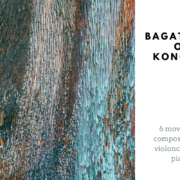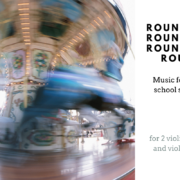Bagatelles Of Koncsol
Original title:
KONCSOLI BAGATELLEK
The 6-movement composition reflects on the poet László Koncsol’s book Bagatelles. The content of the poems, in contrast to the light mood of bagatelle form and the simple lyric, touches on serious themes. This inner tension also characterizes the mood of every movements.
PARTS
I. Vadak (Wild Animals)
II. Mr. Parkinson
III. Jövőm (My Future)
IV. Idil (Idyll)
V. Búcsú (Farwell)
VI. A lélek (The Spirit)
First preformed:
15.05.2019.
Marble chamber of the Hungarian Radio
Krisztina Fejes, piano
László Onczay, violoncello



